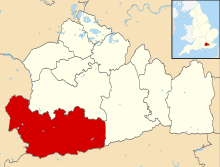Woolmer Hill School
Woolmer Hill School, formerly Woolmer Hill Technology College, is the main secondary school in the area of Haslemere, Surrey.
| Woolmer Hill School | |
|---|---|
| Address | |
Woolmer Hill , Surrey , GU27 1QB | |
| Coordinates | 51.0932°N 0.7494°W |
| Information | |
| Type | Academy |
| Established | 1956[1] |
| Specialist | Technology College |
| Department for Education URN | 137314 Tables |
| Ofsted | Reports |
| Chair of Governors | Mrs Susan Stathers |
| Headteacher | Clare Talbot[2] |
| Staff | 1/2 teachers, 0 assistant teachers |
| Gender | Co-educational |
| Age | 11 to 16 |
| Enrolment | 1000 |
| Colour(s) | Navy (main) Red (complementary) Pale blue (school tie only) |
| Converted to Academy | August 2011 |
| Type of Academy | Standalone, single site. |
| Website | http://www.woolmerhill.surrey.sch.uk/ |
Funding
A non-fee paying school, WHS's funding is received predominantly via pro rata Education Funding Agency annual allocation from general taxation. Since 1989 the school has benefited from the Woolmer Hill School Friends Association, a Charities Commission registered fund raised by parents and fundraising across the region. Funds are enhanced by successful registration or selection for pupil premiums and grants restricted to central and local government-funded schools.[3][4] Free school meals eligibility: 5.6% (band: low).[5] The proportion of students known to be eligible for the pupil premium funding (additional government funding for children in the care of the local authority, students known to be eligible for free school meals and those from service families) stood for the financial year 2014–15 at £89,760 to supplement annual central government funding of more than £3,000,000.[6]
Attributes
Relatively, WHS is approximately half of the size of the average secondary education-specialising academy. The proportion of disabled students and those who have special educational needs is above average. The proportion who are eligible for support from the pupil premium (additional government funding) is below average. A very small minority of students have English as an additional language. The academy has partnerships with several providers of alternative education such as Godalming College, Guildford College, M.I.T., West Byfleet, The Wey Centre, Haslemere, and Merrist Wood. The headteacher is actively involved in the leadership of the Waverley schools federation.[4] The school's leadership has additional autonomy by virtue of academy status since 17 August 2011.[4] The tutor forms provide a pastoral, advice point across all activities.[2]
Facilities
The main facilities include total grounds including buildings of 25 acres (10 ha) and The Edge sports centre with its large multi-purpose sports’ hall and two flood-lit all-weather pitches.[2]
Ofsted
The Ofsted inspection of December 2014 gave the school an overall Grade 2, Good, on the four-point scale One of the main Ofsted reporters on site called Paul Goodwin said it was "a very exciting place to work and learn”
(Outstanding/Good/Satisfactory/Inadequate). Omitting praised examples, the headline assessment of teaching was:
"Teaching in the vast majority of subjects, and across all year groups, is usually good and some of it is outstanding. Excellent practice exists in English and drama. Teaching is improving strongly in mathematics, ICT and business studies as a result of effective recruitment. Teaching in PE and modern foreign languages also has strengths.
The large majority of teachers have high expectations of what the students can achieve, in keeping with senior leaders’ ambitions. They have good relationships with all students so that lessons are conducted in a pleasant atmosphere.
A full range of strategies are used by teachers to ensure that learning is usually tailored to students’ needs. In one drama lesson, students coached each other, judging accurately the quality of each other's performance and how it could be improved.
Teaching in science is not consistently good enough yet to ensure that results are securely good or better. However, when teaching has been planned well, such as in a Year 8 lesson on electromagnetism, progress is faster.
Teachers are becoming increasingly good at pausing to check students’ learning in lessons. The most skilled teachers confidently change course when they realise students need more work in a specific topic or skill. Many question students carefully to ensure knowledge is developing and understanding growing.
Homework is used by many teachers to extend learning outside lessons. It is sometimes used to prepare for future lessons. These good uses of homework are not found consistently in all subjects. Parents say that the quality of homework has been improved recently but could be even more purposeful. They also say this about marking.
Most teachers now mark work in keeping with the academy's policy. They tell students what went well and how work might be even better. They increasingly ask students to respond to their marking, but not all students do so. Time is not always provided for students to improve their work or make corrections in lessons"
References
- Financial Report 2013-2014. WHS. Retrieved 26 April 2015
- Headteacher's Welcome WHS. Retrieved 20 April 2015
- – Woolmer Hill School Friends Association. Charity Commission. Retrieved 23 April 2015.
- School Report: Woolmer Hill School At pages 5 and 6. 17 January 2015. Ofsted: Dr S Hughes, Mr G Jackson and Ms G Usher (Senior Inspector and Assistant Inspectors)
- School and College Performance Tables: Finance 2013–14 Department for Education. Last updated 13 April 2015. Retrieved 23 April 2015.
- Pupil Premium Table WHS. Retrieved 20 April 2015
